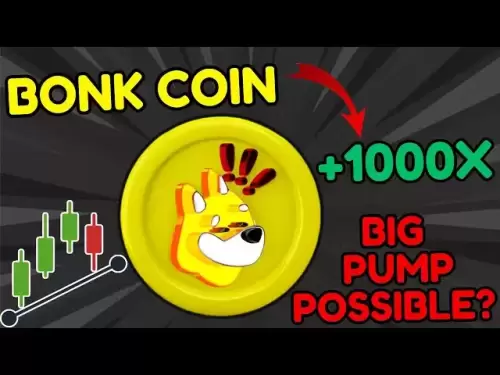-
 Bitcoin
Bitcoin $101,898.5005
-0.75% -
 Ethereum
Ethereum $2,258.1125
-1.07% -
 Tether USDt
Tether USDt $1.0004
0.01% -
 XRP
XRP $2.0178
-2.93% -
 BNB
BNB $624.0243
-1.53% -
 Solana
Solana $134.3298
-0.90% -
 USDC
USDC $0.9999
0.01% -
 TRON
TRON $0.2675
-2.05% -
 Dogecoin
Dogecoin $0.1538
-1.96% -
 Cardano
Cardano $0.5482
-1.11% -
 Hyperliquid
Hyperliquid $35.5636
5.45% -
 Bitcoin Cash
Bitcoin Cash $453.4902
-1.66% -
 Sui
Sui $2.5134
-2.97% -
 UNUS SED LEO
UNUS SED LEO $9.1292
1.77% -
 Chainlink
Chainlink $11.8457
-1.60% -
 Stellar
Stellar $0.2312
-2.73% -
 Avalanche
Avalanche $16.9721
0.29% -
 Toncoin
Toncoin $2.7549
-3.82% -
 Shiba Inu
Shiba Inu $0.0...01081
-1.10% -
 Litecoin
Litecoin $80.8250
-0.71% -
 Hedera
Hedera $0.1374
0.21% -
 Monero
Monero $305.4827
-2.36% -
 Ethena USDe
Ethena USDe $1.0006
0.00% -
 Dai
Dai $1.0000
-0.01% -
 Polkadot
Polkadot $3.2085
-3.12% -
 Bitget Token
Bitget Token $4.0845
-3.13% -
 Uniswap
Uniswap $6.3353
-1.63% -
 Pi
Pi $0.5085
-0.70% -
 Pepe
Pepe $0.0...08913
-3.82% -
 Aave
Aave $232.7090
-0.58%
What is the smart contract interaction process for wallet addresses?
A wallet address interacts with smart contracts by sending signed transactions that trigger specific functions, enabling actions like token transfers or approvals on the blockchain.
Jun 16, 2025 at 10:56 am
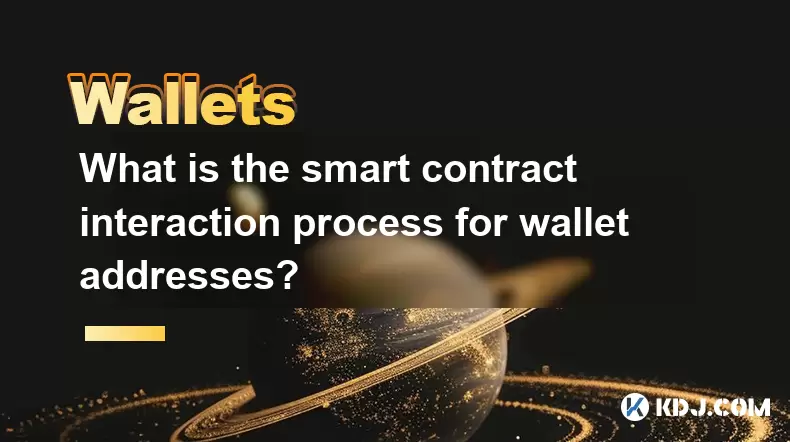
What is the Smart Contract Interaction Process for Wallet Addresses?
Smart contract interaction through wallet addresses lies at the heart of decentralized applications (dApps) and blockchain-based ecosystems. Understanding how a wallet address interacts with smart contracts is crucial for developers, users, and investors engaging with Ethereum or other EVM-compatible blockchains.
How Do Wallets Communicate With Smart Contracts?
A wallet address is essentially a public key derived from a private key used to sign transactions. When interacting with a smart contract, the wallet does not directly run code but sends signed transactions that invoke specific functions within the deployed smart contract.
These interactions are possible because each smart contract has an on-chain address and a defined Application Binary Interface (ABI). The ABI specifies what functions can be called and how data should be formatted. When a user initiates an action—like transferring tokens or approving a spender—the wallet constructs a transaction based on the ABI and sends it to the network.
What Happens When a Wallet Sends a Transaction to a Smart Contract?
Once a transaction is sent from a wallet, it goes through several stages before execution:
- Signing: The wallet signs the transaction using the user's private key, ensuring authenticity.
- Broadcasting: The signed transaction is broadcasted to the Ethereum network via nodes.
- Mining/Validation: Miners or validators pick up the transaction and include it in a block after verifying its validity.
- Execution: The Ethereum Virtual Machine (EVM) runs the smart contract function specified in the transaction.
During execution, if the function modifies the state (e.g., updating balances), these changes are permanently recorded on the blockchain. If the function is a read-only call (view/pure), no transaction is mined, and the result is returned instantly without altering the blockchain state.
What Are the Different Types of Interactions Between Wallets and Smart Contracts?
Wallets interact with smart contracts in multiple ways depending on the function being executed:
- Function Calls: Invoking functions like
transfer(address, uint256)orapprove(address, uint256)on ERC-20 tokens. - Contract Deployment: Sending a transaction with contract bytecode to create a new contract on the blockchain.
- Reading Data: Querying contract storage variables such as balanceOf(address) without spending gas.
- Event Listening: Subscribing to events emitted by smart contracts, like Transfer or Approval logs.
Each interaction type requires different handling by the wallet. For instance, reading data doesn’t require signing, while writing data always involves a signed transaction and gas payment.
How Does Gas Work During Smart Contract Interactions?
Every interaction that alters the blockchain state consumes gas, which is paid in ETH or the native token of the chain being used. Gas fees depend on network congestion and complexity of the operation.
When a wallet sends a transaction to a smart contract, it must specify:
- Gas Limit: Maximum amount of gas the sender is willing to spend.
- Gas Price: Amount of ETH per unit of gas (or base fee + priority fee in post-EIP-1559 transactions).
The wallet estimates these values based on current network conditions. If the gas limit is too low, the transaction fails and the gas is still consumed. If it's too high, unused gas is refunded.
What Tools and Standards Enable Wallet-Smart Contract Communication?
Several standards and tools facilitate seamless communication between wallets and smart contracts:
- ERC-20, ERC-721, ERC-1155: These token standards define how wallets can interact with fungible and non-fungible tokens.
- Web3.js / Ethers.js: JavaScript libraries used by dApps and wallets to interface with the blockchain.
- MetaMask Inpage Provider: Allows websites to request wallet interactions via injected web3 providers.
- WalletConnect: Protocol enabling secure communication between mobile wallets and dApps via QR codes or deep links.
These tools abstract much of the complexity behind sending and receiving transactions, making it easier for users to engage with smart contracts without needing technical expertise.
Frequently Asked Questions
Q: Can a wallet address own a smart contract?
Yes, when a wallet deploys a smart contract, that wallet becomes the deployer and owner unless ownership is transferred. Ownership often grants special permissions within the contract.
Q: Why do some smart contract interactions fail even with enough funds?
Interactions may fail due to insufficient gas limits, incorrect function parameters, or reverts within the contract logic (e.g., failed require statements).
Q: Is it safe to approve unlimited token access to a smart contract?
Approving unlimited access can pose risks if the contract behaves maliciously. It’s generally safer to approve only the necessary amount rather than granting full access.
Q: Can I cancel a transaction once sent from my wallet to a smart contract?
Once a transaction is confirmed on the blockchain, it cannot be canceled. However, if it's still pending, you may replace it with a higher gas price transaction using the same nonce.
Disclaimer:info@kdj.com
The information provided is not trading advice. kdj.com does not assume any responsibility for any investments made based on the information provided in this article. Cryptocurrencies are highly volatile and it is highly recommended that you invest with caution after thorough research!
If you believe that the content used on this website infringes your copyright, please contact us immediately (info@kdj.com) and we will delete it promptly.
- FUNToken: Decoding Past Trends and Getting Started in the Gaming Crypto Sphere
- 2025-06-23 22:25:12
- BTC Price Analysis: Navigating Volatility and the Quest for a New ATH
- 2025-06-23 22:25:12
- Genesis, Bitcoin Mining, and Air-Cooled Miners: A New Era?
- 2025-06-23 22:45:12
- Coinbase's Growth and Resilience: Navigating the Crypto Landscape
- 2025-06-23 22:45:12
- Bitcoin Options Market: Bullish Bets Amidst Geopolitical Jitters
- 2025-06-23 22:51:52
- Dubai's Virtual Asset Scene Heats Up: GAP 3 Partners Lands Landmark Investment Advisor License
- 2025-06-23 22:55:12
Related knowledge
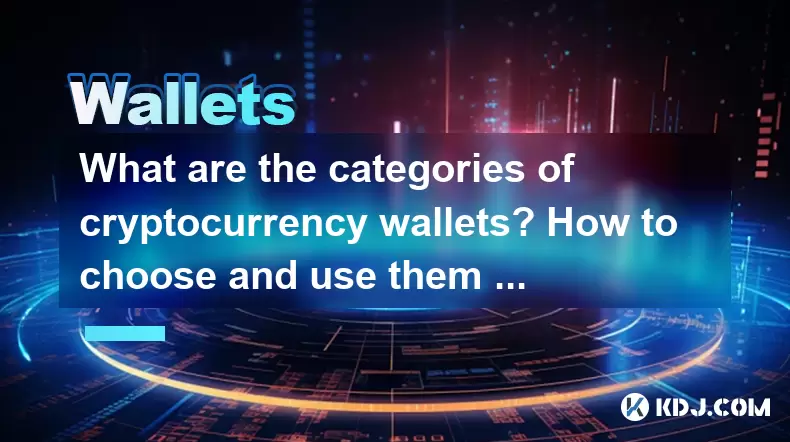
What are the categories of cryptocurrency wallets? How to choose and use them safely?
Jun 21,2025 at 10:42pm
Understanding Cryptocurrency WalletsCryptocurrency wallets are essential tools for anyone involved in the digital asset ecosystem. They allow users to store, send, and receive cryptocurrencies securely. Unlike traditional wallets that hold physical money, crypto wallets manage cryptographic keys—private and public—which interact with blockchain networks...
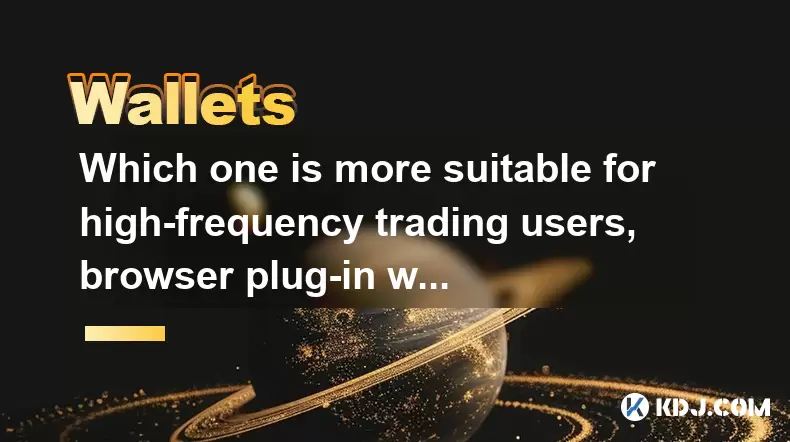
Which one is more suitable for high-frequency trading users, browser plug-in wallets or independent application wallets?
Jun 23,2025 at 08:22am
Understanding the Role of Wallets in High-Frequency TradingFor high-frequency trading (HFT) users in the cryptocurrency market, wallet selection is critical due to the need for speed, security, and seamless integration with trading platforms. HFT involves executing a large number of trades within seconds or even milliseconds, which demands a wallet that...
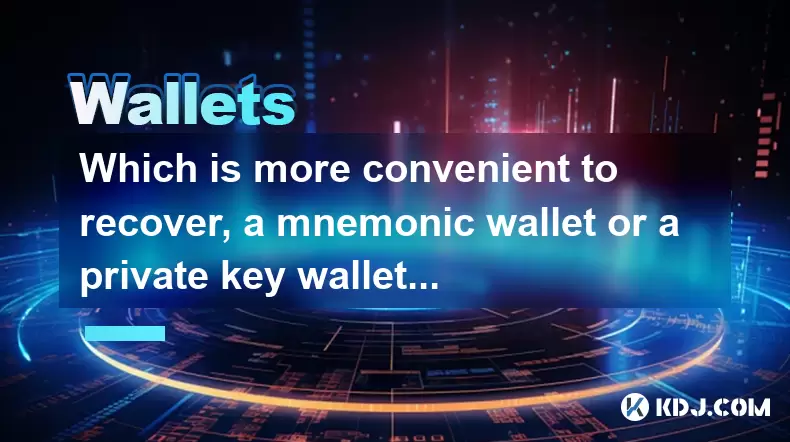
Which is more convenient to recover, a mnemonic wallet or a private key wallet? Will security be compromised?
Jun 20,2025 at 06:36am
Understanding Mnemonic Wallets and Private Key WalletsIn the world of cryptocurrency, wallet recovery is a crucial aspect that users must understand before storing digital assets. Two popular methods for securing and recovering wallets are mnemonic phrases and private keys. Both serve as gateways to access funds, but they differ significantly in terms o...
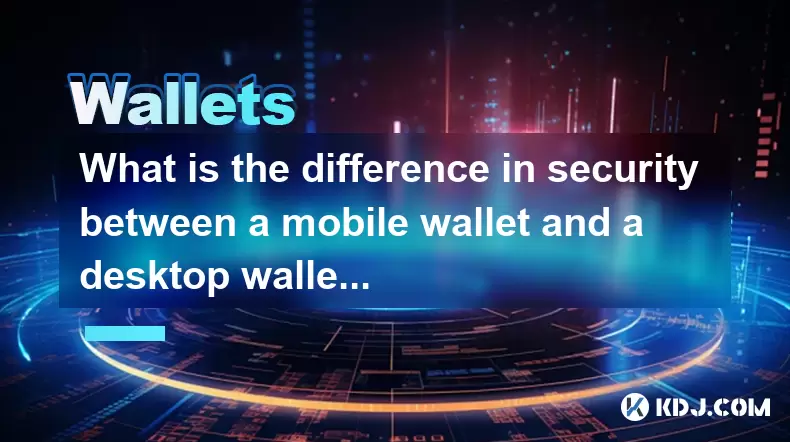
What is the difference in security between a mobile wallet and a desktop wallet?
Jun 22,2025 at 12:35pm
Understanding the Security Aspects of Mobile WalletsMobile wallets are digital wallets designed to run on smartphones, allowing users to store, send, and receive cryptocurrencies conveniently. The security of mobile wallets largely depends on how well the device is protected from malware, phishing attacks, and unauthorized access. One key feature of mob...
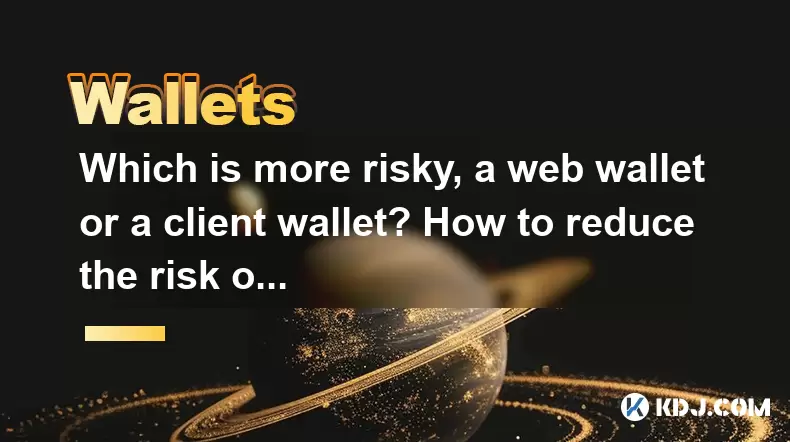
Which is more risky, a web wallet or a client wallet? How to reduce the risk of use?
Jun 22,2025 at 09:21pm
Understanding Web Wallets and Client WalletsWhen managing cryptocurrencies, choosing the right type of wallet is crucial. Web wallets and client wallets are two popular options among users, each with its own set of advantages and disadvantages. A web wallet operates through a browser interface and is usually hosted online by third-party services. This m...
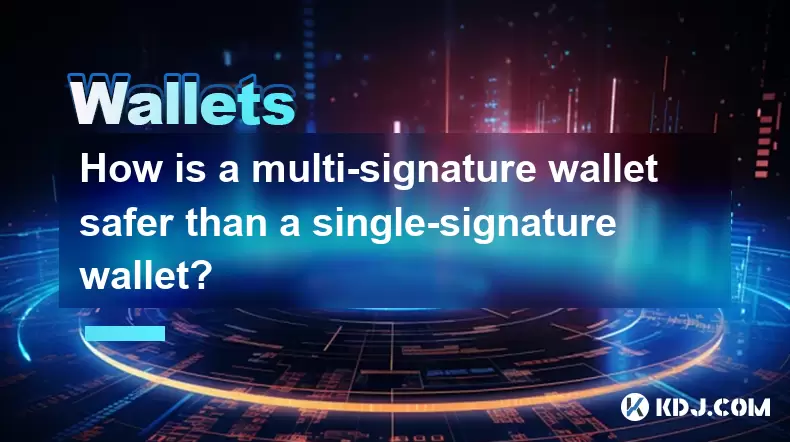
How is a multi-signature wallet safer than a single-signature wallet?
Jun 21,2025 at 07:56pm
Understanding Signature Mechanisms in Cryptocurrency WalletsIn the world of cryptocurrency, securing digital assets is paramount. One of the core aspects of this security lies in the signature mechanism used by wallets. A single-signature wallet requires only one private key to authorize a transaction. This means that if an attacker gains access to that...

What are the categories of cryptocurrency wallets? How to choose and use them safely?
Jun 21,2025 at 10:42pm
Understanding Cryptocurrency WalletsCryptocurrency wallets are essential tools for anyone involved in the digital asset ecosystem. They allow users to store, send, and receive cryptocurrencies securely. Unlike traditional wallets that hold physical money, crypto wallets manage cryptographic keys—private and public—which interact with blockchain networks...

Which one is more suitable for high-frequency trading users, browser plug-in wallets or independent application wallets?
Jun 23,2025 at 08:22am
Understanding the Role of Wallets in High-Frequency TradingFor high-frequency trading (HFT) users in the cryptocurrency market, wallet selection is critical due to the need for speed, security, and seamless integration with trading platforms. HFT involves executing a large number of trades within seconds or even milliseconds, which demands a wallet that...

Which is more convenient to recover, a mnemonic wallet or a private key wallet? Will security be compromised?
Jun 20,2025 at 06:36am
Understanding Mnemonic Wallets and Private Key WalletsIn the world of cryptocurrency, wallet recovery is a crucial aspect that users must understand before storing digital assets. Two popular methods for securing and recovering wallets are mnemonic phrases and private keys. Both serve as gateways to access funds, but they differ significantly in terms o...

What is the difference in security between a mobile wallet and a desktop wallet?
Jun 22,2025 at 12:35pm
Understanding the Security Aspects of Mobile WalletsMobile wallets are digital wallets designed to run on smartphones, allowing users to store, send, and receive cryptocurrencies conveniently. The security of mobile wallets largely depends on how well the device is protected from malware, phishing attacks, and unauthorized access. One key feature of mob...

Which is more risky, a web wallet or a client wallet? How to reduce the risk of use?
Jun 22,2025 at 09:21pm
Understanding Web Wallets and Client WalletsWhen managing cryptocurrencies, choosing the right type of wallet is crucial. Web wallets and client wallets are two popular options among users, each with its own set of advantages and disadvantages. A web wallet operates through a browser interface and is usually hosted online by third-party services. This m...

How is a multi-signature wallet safer than a single-signature wallet?
Jun 21,2025 at 07:56pm
Understanding Signature Mechanisms in Cryptocurrency WalletsIn the world of cryptocurrency, securing digital assets is paramount. One of the core aspects of this security lies in the signature mechanism used by wallets. A single-signature wallet requires only one private key to authorize a transaction. This means that if an attacker gains access to that...
See all articles




















